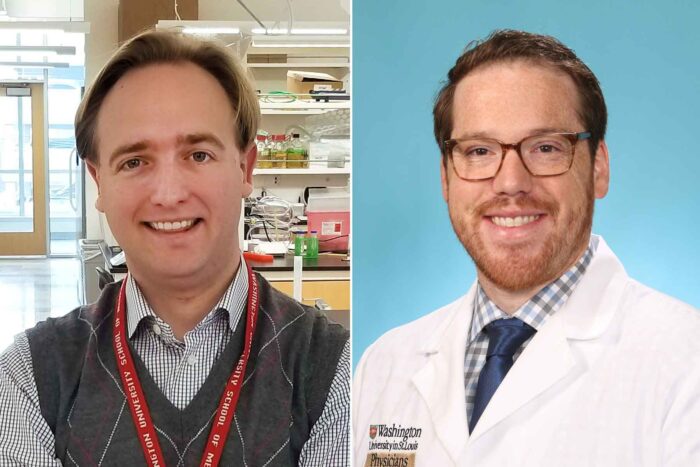Brestoff, Theunissen recognized by NIH for innovative research
Honored with NIH’s High-Risk, High-Reward Research Program awards
 Washington University
Washington UniversityThorold Theunissen, PhD, (left) and Jonathan Brestoff, MD, PhD, have received High-Risk, High-Reward Research awards from the National Institutes of Health (NIH), supporting their research programs.
Obesity expert Jonathan R. Brestoff, MD, PhD, and regenerative medicine specialist Thorold Theunissen, PhD, both of Washington University School of Medicine in St. Louis, have received High-Risk, High-Reward Research awards from the National Institutes of Health (NIH). The program supports scientists showing exceptional creativity and pursuing innovative research programs with the potential to have a wide impact in biomedical, behavioral and social sciences.
 Brestoff, an assistant professor of pathology and immunology, received an NIH Director’s Early Independence Award to study how the immune system regulates weight gain, with a goal of finding new ways to treat obesity beyond simply limiting food consumption. Early Independence Awards provide an opportunity for outstanding junior scientists with the intellect, scientific creativity, drive and maturity to flourish independently, launch independent research careers and bypass the traditional postdoctoral training period. The award provides up to $250,000 a year for five years.
Brestoff, an assistant professor of pathology and immunology, received an NIH Director’s Early Independence Award to study how the immune system regulates weight gain, with a goal of finding new ways to treat obesity beyond simply limiting food consumption. Early Independence Awards provide an opportunity for outstanding junior scientists with the intellect, scientific creativity, drive and maturity to flourish independently, launch independent research careers and bypass the traditional postdoctoral training period. The award provides up to $250,000 a year for five years.
Brestoff and others have shown that immune cells in fat tissue control how calories are stored. Recently, he discovered that fat cells can transfer their mitochondria – tiny organelles responsible for generating energy in cells – to macrophages, a kind of immune cell known to be involved in regulating obesity. With the new award, Brestoff will develop tools to disrupt mitochondria transfer in mice to determine the impact of this process on the function of immune cells and on the development of metabolic diseases such as obesity. The goal is to discover potential targets for medications to treat metabolic diseases.
“I am honored and humbled to be selected for the NIH director’s High-Risk, High-Reward program,” Brestoff said. “The Early Independence Award is allowing me to take my science in new, unanticipated directions at a critical point in my program and will enable my lab to explore highly innovative questions that keep me up at night. I am grateful and excited to have the opportunity to start my lab here at Washington University School of Medicine and join this incredible community of investigators.”
Brestoff earned his bachelor’s degree at Skidmore College, followed by a master’s in public health at University College Cork – National University of Ireland. He then returned to the United States and earned his medical and doctoral degrees at Perelman School of Medicine at the University of Pennsylvania before completing a residency in clinical pathology at Barnes-Jewish Hospital. He joined the faculty of the School of Medicine this year. Brestoff is also a new medical director of clinical immunology in the Division of Laboratory and Genomic Medicine, where he helps to support clinical tests of the human immune system.
 Theunissen, an assistant professor of developmental biology, has received an NIH Director’s New Innovator Award. The award supports unusually innovative research from early-career investigators who are within 10 years of their final degrees or clinical residencies. The award provides $300,000 per year in direct funding for five years.
Theunissen, an assistant professor of developmental biology, has received an NIH Director’s New Innovator Award. The award supports unusually innovative research from early-career investigators who are within 10 years of their final degrees or clinical residencies. The award provides $300,000 per year in direct funding for five years.
Theunissen studies the biology of pluripotent stem cells, which have the potential to heal or regenerate different types of tissues and organs that are damaged or diseased. Recently, he isolated a more primitive type of human stem cell that closely resembles the cells of the early human embryo. The award supports a project aimed at understanding the epigenome of these stem cells and their utility for modeling human diseases.
The epigenome refers to the layer of genetic instructions that govern how genes are regulated — whether certain genes are turned off or on and to what degree they are activated. Theunissen and his research team are developing a road map to help understand the epigenetic changes that stem cells undergo as they divide and differentiate toward one tissue type or another.
“It is an honor to receive this NIH director’s award,” Theunissen said. “My colleagues in the lab and I look forward to continuing our research into the regulatory details of distinct stem cell states that could help us better understand healthy human development and what can go wrong to cause disease.”
Theunissen earned his bachelor’s degree in biology in 2007 from Harvard University. He went on to earn a master’s degree in developmental biology from the University of Cambridge in 2008 and a doctorate in biochemistry and stem cell biology, also from Cambridge, in 2011. He continued his training at the Whitehead Institute for Biomedical Research at the Massachusetts Institute of Technology, where he was a Sir Henry Wellcome postdoctoral fellow. In 2017, he joined the faculty of the Department of Developmental Biology at the School of Medicine, where he is also a researcher at the Center of Regenerative Medicine.






